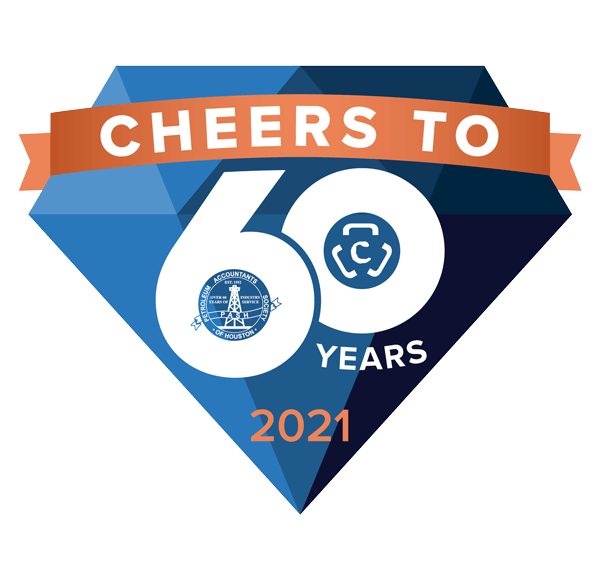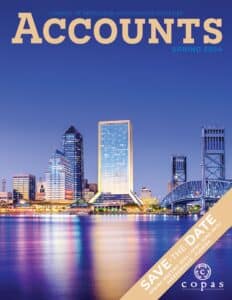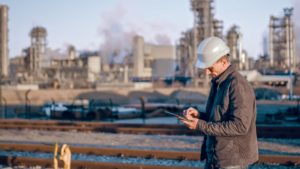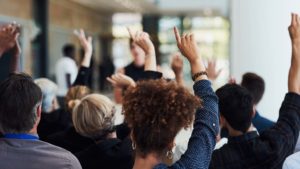Celebrating 60 Years of COPAS
A diamond anniversary. A dazzling history.
Since starting in 1961, COPAS has been uniting people with a shared mission—a mission to grow. And together, we’ve done that! Today, we are 2,600 members and 26 societies strong. Together, we’ve grown as professionals, people and friends. We’ve challenged accounting procedures in our industry, forged new paths and set the standard for how business is done in oil & gas!

The ‘4 Cs’ of COPAS
We’re A Cut Above The Rest
We Bring Clarity to Every Accounting Issue
We Color Outside of the Lines – on purpose!
Our Knowledge Shines Like a Full Carat!
Diamonds are Forever. Just Like the Love for Our Members.
We thank each and every COPAS member over the past 60 years for their hand in shaping who we are today. Your passion and dedication are what make our organization truly one-of-a-kind. To celebrate, we’ve collected 100 fun facts every COPAS member should know—or at least, enjoy knowing!
COPAS Firsts
The first COPAS directory was published by Ross-Martin in 1962.
The first issue of “COPAS Accounts” was published on April 21, 1980.
Bernardette Huston (Anchorage) was the first woman COPAS president, serving in 1990.
First COPAS scholarship, in the amount of $500 and provided by publication printer Ross-Martin (later Kraftbilt), was awarded to James A. Wilson at the University of Tulsa in May 1968.
The Accredited Petroleum Accountant® program started in 1994. The program originally began as the “PASOK” program. PASOK stood for Petroleum Accountants Standard of Knowledge. “PASOK” was dropped from the accreditation program in 1995. The first APA® test was given in Midland in 1996. In 1998, the administrative functions of the APA® program, previously handled by PDI, were handled by the COPAS office.
In 1995, COPAS put a webpage on the internet using the domain name of COPAS.org.
The first meeting of the Small Oil and Gas Companies Committee was in April 1996. The committee began as a special committee before attaining standing committee status in 1999.
Twelve societies were charter members of COPAS; Los Angeles, Oklahoma-Tulsa, Kansas, Houston, Oklahoma City, Fort Worth, San Antonio. Dallas, Colorado, Canada and Permian Basin.
The oldest society formed was Los Angeles in 1926. The society later disbanded.
The Petroleum Accountants Society of Oklahoma-Tulsa was formed in 1929 and is currently the oldest continuously-operated society.
The first organizational meeting of COPAS was held February 11, 1961 in Dallas, Texas. Eight societies were present.
The newest COPAS society is the Petroleum Accountants Society of Austin, admitted April 24, 2020.
COPAS Records
Carl Sebits, now deceased, was a member of the Kansas COPAS society for more than 70 years. Carl joined 1938, 23 years prior to COPAS being formed!
The highest positive Accounting Procedure Wage Index Adjustment percentage was +16.7 in 1975.
The highest recorded attendance at a COPAS meeting was 385 at the fall 1996 meeting in Oklahoma City.
The highest annual membership count in COPAS was 5,074 in 1982.
COPAS Crazy-But-True Facts!
Member Ellen Karisch interviewed with and gave serious consideration to pursuing a career with the CIA.
If member Jennifer Segelhorst was not working in the oil and gas industry, she would run a horse ranch.
Marvinette Ponder joined COPAS because her supervisor, “General” Sandy Launchbaugh, would not accept no for an answer!
Mike Cougevan made it through for all but three days of high school chemistry class without a book.
Tom Kelley was a journalist before moving to the oil and gas industry.
Jane Schulte played professional women’s football, even while pregnant!
Although Marjorie Saibara is a life-long Houstonian, she is the great granddaughter of Seito Saibara, a turn-of-the-century diplomat from Japan.
Craig McBeth spent two years as a missionary in Japan.
While on the Oklahoma City society board, Jodie Ford’s van burned to a crisp on the side of the highway (after running over a mattress); however, she saved the boxes of local society COPAS documents in the back before abandoning the van!
When Jon Gear was Executive Director, there was a board meeting “after party” at Jon’s Victorian home in Denison, where Pat Martindale and Jon brought out their guitars and they all sang folk music.
Carolyn Sczepanski has acted in two movies and won several cooking contests.
Tom Batsche is still remembered today for his vocal rendition of “El Paso” during karaoke night.
Bob Wilkinson was allowed to go on stage and take pictures of the Doobie Brothers at a concert in 1978.
Phil Fischer’s family lineage spans five generations of Californians.
Mary Frances Hermes, now deceased, loved to travel. She visited Yugoslavia under Dictator Tito, where militia were stationed on street corners with automatic weapons.
John Hultin worked his way through college as a cab driver.
Jeff Wright has flown into, or out of, 289 different airports worldwide.
It is rumored that Jean Martindale, wife of Pat Martindale, has attended the most COPAS meetings as a member spouse.
Tom Wierman refereed youth, high school and college soccer, and yes – he has tossed players, coaches AND parents. Tom’s dad bought a ’65 4-door Rambler at a farm auction for Tom’s first car. Smart move on his dad’s part because if Tom drove it faster than 55 mph, it made the whole car shimmy.
John Draemer was a cheerleader in high school. In the December 1961 issue of Boys’ Life magazine, a photo was included of John working in a chemistry lab. At that time, John hoped to become a chemical engineer.
In 1961, oil was $2.88/bbl and gas was $.05/mcf. In 1971, oil finally broke $3/bbl and gas was $.18/mcf.
In 1961, Doyle Wofford was a senior in high school in Grove, Oklahoma, and was sharpening his skills as a hustler in the local pool hall.
In 1961, when COPAS held their first meeting in Midland, Texas, former Executive Director Jon Gear was driving a truck in Houston, delivering Dixie Cups to stores.
The original membership assessment in 1961 was $25 per society. The membership assessment has changed only 8 times in 60 years, starting at $10/member in 1980 to the current $95/member rate effective 2021. The rate of $30/member was in effect for 17 years.
There were 1,484 COPAS members in 1962.
In 1964, there were no copyrights for our materials; anyone could print them, not just Ross-Martin. Ross-Martin (later known as Kraftbilt) published all COPAS documents until Executive Director Jon Gear brought the function in house.
In 1968, Peggy Malatesta was a junior in high school in Tucson, where she was photo editor of the school yearbook, and a penpal to soldiers in Vietnam.
Average COPAS expense for the first six years of operation was $19.37 per year.
In 1971, Pat Martindale was a freshman at Oklahoma Christian University and wore “huge” bushy sideburns!
In the early days, COPAS charged each society for membership directories that were printed by Ross-Martin (later known as Kraftbilt). The cost in 1973 was 95 cents. Not every member received a copy. Each society purchased only the number they needed which usually wasn’t that many.
Registration fees to attend a COPAS meeting were originally $20, then increased to $30 in October, 1976.
The COPAS membership roster was printed and bound until changing to an electronic format in 1997. The roster was delivered to members on a 3 ½ inch floppy disk. In 2002, the membership directory migrated to the website and the floppy disk distribution discontinued. Each society began to maintain their membership lists. The member directory is now online and accessible through a member user account.
COPAS Organizational Highlights
The current COPAS logo was designed after an abstract and artistic depiction of a drill bit.
The COPAS tagline “Turning Energy Into Synergy” was adopted as part of the marketing campaign in 2002. The tag line was chosen because it clearly defines what COPAS has been able to accomplish in its 50-year history with the publication of documents that have significantly impacted accounting in the industry. By using our combined energy, we have in the past and will continue to in the future, define industry accounting standards, and be the leader in producing educational and informative documents. The new COPAS logo and tagline were trademarked and service marked in 2003.
COPAS has apparently been following a long-standing practice at our meetings. From the minutes of the 1960s: “The president suggested that all delegates and guests to the meeting stand and introduce themselves, furnishing their name, and the society as well as company affiliation.” How’s that for a storied COPAS tradition?
COPAS established an endowment in 1993 in memory of John Jolly, to commemorate his dedication, long-term commitment, and high achievements in the oil and gas industry.
COPAS has been approached by individuals interested in forming societies in New York City, as well as Norway, Australia, and Peru. (There were others, such as Spain.)
A $10 special assessment to replenish the COPAS treasury (payable immediately) was declared in October 1971. Special assessment of $25 per society was made in May 1977.
COPAS meetings have been held in unusual buildings, such as a public library in Kansas, and a state legislative chamber in Mississippi. Unusual locations where meetings were held include Universal City, Las Vegas, and Branson.
COPAS received but rejected a request to translate COPAS publications into Arabic. The Chinese National Oil Company also approached COPAS about translating documents.
Meeting attendees have traveled from as far away as China to attend COPAS meetings; two Chinese representatives attended in 1994.
The COPAS Antitrust Policy Statement was not always in effect; it was approved in 1998.
A pocket-sized version of Bulletin No 6 – Material Classification Manual, was developed in 1991.
Although COPAS adopted a new logo, COPAS must continue to use the old logo in order to retain the trademark; that is why you see both logos in the COPAS History section in each issue of ACCOUNTS, and every published document.
The COPAS office has been located in only three geographical areas prior to 2010: Dallas, Denver and Denison. In 2010, the office moved across Denver to the city of Lakewood.
COPAS governance was originally handled by three officers and five executive committee members, all elected by the council.
The office of Secretary-Treasurer was separated in 1982, creating four officers for the first time in COPAS history.
In 1986, the Bylaws were again amended to change the name of the Executive Committee to Board of Directors. Board members were then nominated by region. The Board of Directors, rather than the Council, elected the officers.
The Monthly Messenger, a COPAS newsletter mailed to COPAS leadership, always ended with a “Thought for the Month.” COPAS EXTRA! was published on an “as needed” basis, and was emailed to all COPAS members.
The Executive Secretary title was changed to Executive Director in 1986.
NOGRAS (National Oil and Gas Revenue Accounting School) was held in 1987.
The Jon Gear Meritorious Achievement Award originated in 2006, and recognizes the individual recording the highest overall score of anyone completing the APA® certification program in a given year. The award is named for former COPAS President (1987-88) and Executive Director (1994-2004) Jon Gear in recognition of his efforts in implementing the APA® program in 1996.
Golf has been a long-standing tradition of COPAS meetings. The early council meetings specifically broke for golf or other tours at the meeting location.
The first “First Timers Breakfast” was held at the meeting hosted by Canada in April 2003.
The Research and Advisory (R&A) Committee held an organizational meeting at the fall 1987 council meeting. The committee is made up of past COPAS presidents, with a goal to formulate long-range guidance to the COPAS board.
The first Presidents Leadership Conference was held in 1990 in Concord, California.
EDI (Electronic Data Interchange) was the seventh standing committee in the organization. Richard Tullis (Oklahoma-Tulsa) was the first chairman.
COPAS began accepting credit card payments in July 1998. COPAS was incorporated as a non-profit corporation on January 1, 1999 to be known as Council of Petroleum Accountants, Inc. (COPAS). In 2002, the COPAS office took over the sale of all documents from Kraftbilt.
COPAS Member Highlights
The Wage Index Adjustment for the overhead escalation rates was originally developed by the Oklahoma-Tulsa society. There have been only five times since 1961 when the Accounting Procedure Wage Index Adjustment was a negative adjustment, the first occurring in 1988.
The Houston society has hosted the most national meetings.
In 1976, the Permian Basin society approved a change in their Bylaws so that a member could be a “person” instead of a “man.” There was only one dissenting vote, a past president, who walked out of the meeting!
Several societies were admitted under one name, and subsequently changed their name to another name; for example, Western Canada to Canada, West Central Texas to Abilene, San Joaquin to California and Ohio to Appalachia.
Attendance at COPAS society meetings was affected by acts of terrorism (Murrah bombing in Oklahoma City and 9/11/2001 in NYC) and natural disasters, such as hurricanes Gilbert and Katrina, and crickets at the leadership conference in Abilene.
There are currently 26 participating societies. Over time there have been as many as 28 participating or associate societies. Societies no longer in existence or have merged with other societies include Los Angeles (charter society), San Francisco, Texas Panhandle (Amarillo), High Plains (associate society).
At the organizational meeting of COPAS in Midland, Texas, participants devoted much time deciding on the name. They wanted to be sure that the individual societies retained their independence. They decided on the word “Council” so it would represent an assembly of participating accounting societies. E.W. (Ed) Earle, Western Canada society is credited with suggesting the name of “Council of Petroleum Accountants Societies of North America.” This name was unanimously adopted.
Proxy voting was allowed for the September 1988 meeting only for societies whose representatives were required to leave the meeting early due to Hurricane Gilbert.
When the Canada Society hosted Council meetings, they played both the US and Canadian national anthems.

















